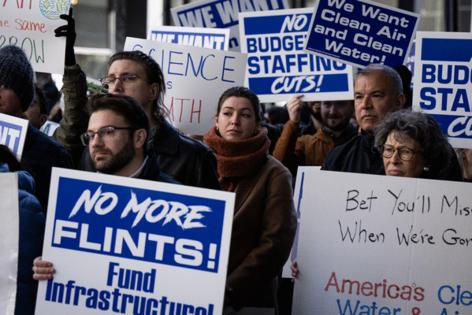Commentary: Erosion of democracy threatens our health
Published in Health & Fitness
Even before the Trump administration’s headline-grabbing assaults on public institutions, our democracy was showing alarming signs of distress. A 2023 Brookings Institution report found that the United States “is experiencing two major forms of democratic erosion in its governing institutions: election manipulation and executive overreach.”
In recent months these dangers to democracy have been dramatically ramped up, drawing expressions of alarm from political scientists, historians, activists and others. But what we may not realize is these threats to democracy also endanger our health.
Countries with greater degrees of democracy enjoy better health. One worldwide study showed that infant and maternal mortality rates dip as the rate of democracy rises. Another study linked stronger democracies to everything from longer life expectancy, lower rates of cardiovascular disease and fewer injuries.
At its core, democracy is designed to empower citizens, giving them a voice in decisions that shape their lives. When this voice is stifled, the consequences reverberate through society, directly affecting health outcomes.
Consider access to health care. Even before President Donald Trump’s attack on Medicaid and the Affordable Care Act with his “One Big Beautiful Bill,” the United States was unique among industrialized countries in not affirming that access to health care is a human right. We have had fledgling movements for health care equity in the United States, but their ability to succeed is directly proportionate to the strength of our democracy.
Authoritarian regimes deny citizens the right to self-determination, divert resources, prioritize political loyalty over public need and ignore demands for better health services. The result is often a decline in health care quality, increased disparities and a sicker population.
Democratic decline also impacts environmental health. Environmental regulations, crucial for clean air and water, are often the product of public pressure and democratic oversight. Without a strong democratic framework, industries can operate with impunity, polluting communities and jeopardizing public health. The recent shuttering of the Environmental Protection Agency’s research and development arm promises to worsen our dire and interlocking environmental crises.
Similarly, disaster preparedness and response, vital for mitigating health crises during natural calamities, rely on transparent governance and public trust. When trust erodes and information is controlled, effective public health responses become impossible. The growing measles outbreak speaks to this. So does the tragic flood in Texas, where calls for help were ignored because of the recent firing of Federal Emergency Management Agency contractors.
The erosion of democracy also takes a toll on our nation’s mental health. Living under a government that disregards civil liberties, suppresses dissent or spreads misinformation fosters an environment of chronic stress, anxiety and fear. The uncertainty about the future, the feeling of powerlessness and the breakdown of social cohesion can lead to widespread depression and mental anguish.
When citizens lose faith in the system and their ability to effect change, a sense of hopelessness and anxiety can pervade. A 2024 American Psychological Association survey found that 77% of American adults reported that the future of their country was a significant source of stress.
Moreover, the rise of political polarization, often fueled by democratic backsliding, fragments communities, leading to increased social isolation and a decline in the supportive social networks essential for mental health. Indeed, loneliness in the United States has become so acute that in 2023 then Surgeon General Vivek Murthy declared it an “epidemic.” Loneliness is associated with a number of health conditions, including heart disease, stroke, dementia and depression.
Democratic governance, with its emphasis on transparency and accountability, is crucial for effective public health policy. Public health initiatives, from vaccination campaigns to disease monitoring, require public trust and cooperation.
Without question, the health of a nation is inextricably linked to the health of its democracy. The erosion of democratic principles is not merely a political abstract; it is a tangible threat to our physical vitality, mental well-being and collective health. When public services land on the chopping block, so does democracy.
Safeguarding democracy is a fundamental act of public health, demanding our vigilance and active participation. Our health depends on it.
_____
Phillip Polakoff’s distinguished career in health and health care spans 45 years. June Sargent is a communications strategist, educator, and nonprofit leader. Both are affiliated with the nonprofit A Healthier WE and coauthors of Building the Healthy American Ecosystem. Together, they have created a petition to make health care a human right. This column was produced for Progressive Perspectives, a project of The Progressive magazine, and distributed by Tribune News Service.
_____
©2025 Tribune Content Agency, LLC.










Comments